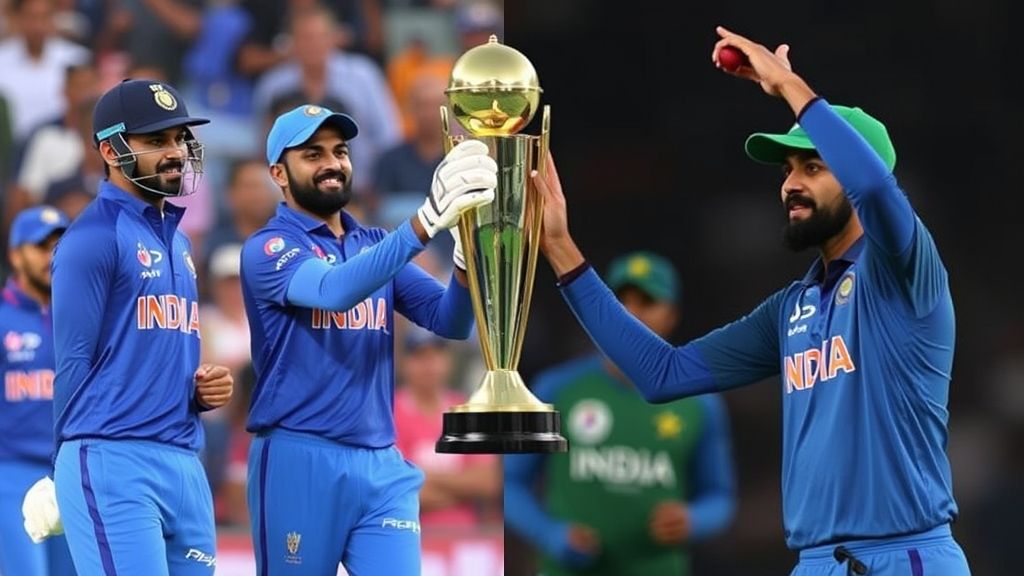The cricketing world is abuzz with the latest developments surrounding the Asia Cup, as Pakistan’s Sports Minister, Ehsan Mani, has reportedly rejected a demand from the Board of Control for Cricket in India (BCCI) to hand over the Asia Cup trophy. This unexpected stance, if true, signifies a significant shift in the ongoing negotiations and sets forth new conditions for the Indian team’s participation in the tournament. The implications of this move are far-reaching, impacting not only the future of the Asia Cup but also the broader relationship between the two cricketing giants.
The BCCI’s Alleged Demand and Pakistan’s Rejection
Reports indicate that the BCCI, facing immense pressure from its government regarding travel to Pakistan due to security concerns, had sought a compromise that would involve Pakistan holding onto the trophy, even if the tournament was moved or played at a neutral venue. This, it was believed, would allow India to potentially participate without the direct involvement of traveling to Pakistan. However, Ehsan Mani’s alleged rejection of this proposal suggests a firm stance from the Pakistan Cricket Board (PCB), likely backed by the government, asserting their rights as hosts and holders of the trophy.
This rejection is not merely a symbolic act; it carries significant weight. The Asia Cup trophy is not just a piece of silverware; it represents the culmination of immense effort, skill, and national pride for the wi
ing team. The idea of handing it over preemptively, even under duress, would undermine the integrity of the competition and the spirit of sportsmanship. For Pakistan, who are the defending champions and are slated to host the tournament, such a demand might be perceived as disrespectful and an attempt to dictate terms.
Setting New Conditions: What Does Pakistan Want?
While details of the “new conditions” remain somewhat veiled, they likely revolve around ensuring the integrity and fairness of the tournament. Several possibilities emerge:
Guarantees of Hosting Rights: Pakistan might be demanding clear assurances that if the tournament proceeds, they will indeed host matches, even if a hybrid model is adopted where some games are played elsewhere. This would involve logistical and financial commitments from other participating nations and the Asian Cricket Council (ACC).
Reciprocity in Bilateral Series: A strong possibility is that Pakistan is seeking reciprocal treatment for their willingness to consider alternative venues. If India ca
ot travel to Pakistan, Pakistan might expect India to reciprocate by agreeing to play bilateral series in Pakistan in the future, or at least committing to a schedule that allows for more regular encounters on Pakistani soil.
Fair Distribution of Hosting: If a hybrid model is on the table, Pakistan might insist on a fair distribution of matches, ensuring they still get a significant share of hosting duties, thereby retaining a degree of control and economic benefit from the event.
ACC’s Neutral Stance: Pakistan could also be pushing for the ACC to take a more neutral and decisive role in resolving the impasse, rather than allowing bilateral political tensions to dictate the fate of a continental tournament. This would mean the ACC holding the BCCI accountable for their stance and ensuring the tournament proceeds as pla
ed or with mutually agreed-upon modifications.
Implications for the Asia Cup and Future Cricket Relations
The current standoff has profound implications for the Asia Cup. If a resolution isn’t found, the tournament could face postponement or cancellation, which would be a significant blow to cricket in Asia. This would disappoint millions of fans and disrupt the international cricketing calendar.
Furthermore, this situation highlights the intricate nexus between politics and sports, particularly between India and Pakistan. The BCCI’s stance is undeniably influenced by the Indian government’s foreign policy, while Pakistan’s firm response is a reflection of their national pride and sovereignty.
The Hybrid Model: A Potential Compromise?
One often-discussed compromise is the “hybrid model,” where Pakistan would host a portion of the tournament, and the remaining matches, potentially involving India, would be played at a neutral venue. This model, while seemingly a logical step, is laden with its own challenges. Who would bear the additional costs? Which neutral venue would be selected, and would it be acceptable to all parties? These are questions that require careful consideration and robust negotiations.
Real-World Precedents and Lessons Learned
We have seen similar situations in the past, where political tensions have threatened sporting events. The Commonwealth Games and other multi-sport events have faced boycotts and withdrawals due to geopolitical reasons. In cricket, the bilateral series between India and Pakistan have been sporadic at best for over a decade, primarily due to security concerns and political climate. This current Asia Cup situation is a stark reminder that while sports can be a bridge, it is not immune to the rifts that exist on the political landscape.
The path forward requires a delicate balance. The BCCI needs to navigate its government’s directives, while the PCB, as the host nation, needs to uphold its hosting rights and the spirit of the game. The ACC has a crucial role to play as a mediator, ensuring that the decision-making process is fair and transparent.
Conclusion: Awaiting a Resolution for the Love of the Game
The rejection of the BCCI’s demand by Ehsan Mani, and the subsequent setting of new conditions, marks a critical juncture in the Asia Cup saga. It underscores Pakistan’s resolve to assert its position and underlines the complexities of organizing a major cricketing event involving two nations with strained diplomatic ties.
For fans eagerly awaiting the spectacle of the Asia Cup, the hope is that cooler heads will prevail. A resolution that respects the rights of the host nation, addresses the security concerns of the visiting team, and, most importantly, prioritizes the spirit of cricket, is paramount. The sports world watches with bated breath, hoping that the love for the game will ultimately triumph over political intricacies, allowing the Asia Cup to be played and enjoyed by all.


